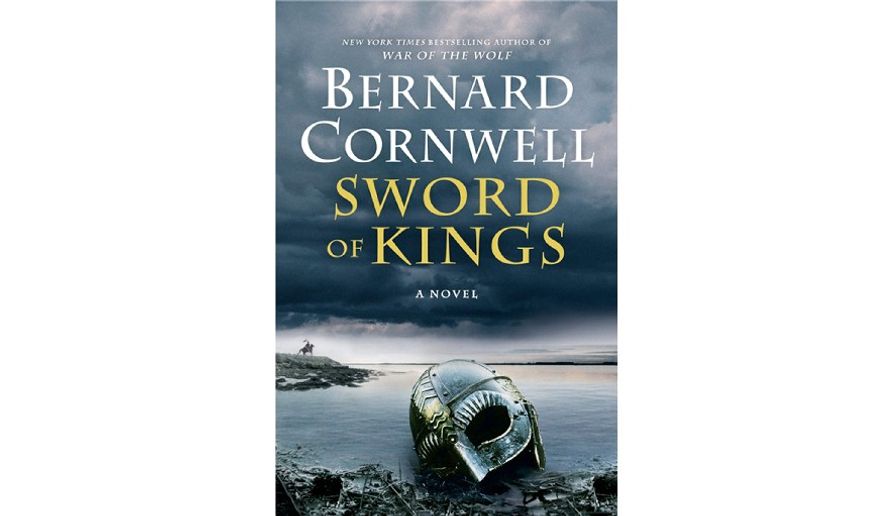OPINION:
I first became acquainted with Bernard Cornwell by watching the “Sharpe” TV series, which was based on his historical novels that featured Richard Sharpe, portrayed by actor Sean Bean, a Napoleonic-era British soldier up from the ranks. Bernard Cornwell described Richard Sharpe as a rogue, but a rogue on our side.
I read the entire Sharpe series and I went on to read his other historical fiction, including his Saxon stories. The Saxon stories cover the bloody path that led to the creation of England in the 9th and 10th centuries.
The hero of the Saxon stories is Uhtred of Bebbanburg, a Saxon lord from Northumbria who was captured by the Danes as a young man and adopted into their tribe. He later fights for Alfred the Great, the King of Wessex.
Alfred the Great’s dream was to unite the Anglo-Saxon kingdoms into one kingdom called England. Mr. Cornwell’s Saxon stories were adapted for television and called “The Last Kingdom,” with actor Alexander Dreymon as Uhtred. The series appears on Netflix.
In Mr. Cornwell’s “King of Swords,” the 12th installment in the Saxon stories, Uhtred, who narrates the stories, becomes involved in the succession of Alfred the Great’s son, King Edward. Edward rules over Wessex, Mercia and East Anglia, and as he lay dying, Uhtred swears an oath to Edward’s likely successor, Aethelstan, to kill his rivals to the throne, Aethelhelm and his evil and rotten nephew, Aelfweard.
Uthred, a pagan and a feared warrior, would like to sit out the medieval game of thrones, but the oath is important to him, although he calls it a “fool’s errand.” With a small army he boards “Spearharfoc,” a warship equipped with sail and 40 rowers, and sails into the fray
Uthred is soon engaged in numerous sea and land battles, which Mr. Cornwell describes in vivid and accurate historical detail.
“The best ways to win any battle are to surprise the enemy, to outnumber the enemy, and to attack that enemy with such speed and ferocity that he has no clue what is happening until a sword is at his throat or a spear-blade is deep in his guts,” Mr. Cornwell’s Uthred tells us.
“We had achieved all three, though at a cost. Immar Hergildson, the least experienced of my men, had seen a red-cloaked rider and thrust up with his spear and so wounded Oswi who had mounted a riderless stallion. Oswi was now cursing and threatening revenge, the horses were still panicking, a woman was screaming, a wounded horse was hammering the road with his hooves, and some of the enemy were scrambling towards the reed beds.”
Uthred, armed with his sword, which he named “Serpent-Breath,” later faces a warrior called Waormund, known as Aethelhelm’s “beast.”
“I had met him only once before that fight in the old house beside Lundene’s river, and at that first meeting I had humiliated him by slapping his face,” Uthred said. “It was an ugly face, a flat face slashed from his right eyebrow to his lower left jaw by a battle scar. He had a bristling brown beard, eyes dead as stone, and a thin-lipped mouth. He was a huge man, taller even than me, a man to be placed at the center of a shield wall to terrify an enemy.”
In order to have his men escape, Uthred allows himself to be taken prisoner.
“Everything dies. We all die. And all that is left of us is reputation. I hoped I would be remembered as a warrior, as a just man, and as a good lord,’ Uthred says to himself as he is taken prisoner. “And perhaps this miserable death by a hedge would be forgotten. My screams would fade, and reputation would echo on in the songs men sang in the hall.
“And Waormund? He had a reputation too, and his renown was cruelty. He would be remembered as a man who would dominate a shield wall, but who delighted in making men suffer and in making women suffer. Yet just as I was known as the man who had killed Ubba by the Sea and as the warrior who had slain Cnut, so Waormund would be known as the man who had killed Uhtred of Bebbanburg.”
Mr. Cornwell not only describes warriors and war well; he also gives the reader a taste and smell of life in medieval times.
I interviewed Bernard Cornwell some years ago. He said he was not a historian. He was simply a storyteller, a novelist. I asked him how accurate the major historical events in his novels were, and he replied, “I try to make them as accurate as possible, but the story takes precedence.”
“Sword of Kings” is a well-researched and well-written historical novel.
• Paul Davis covers crime, espionage and terrorism.
• • •
SWORD OF KINGS
By Bernard Cornwell
Harper, $27.99, 336 pages

Please read our comment policy before commenting.